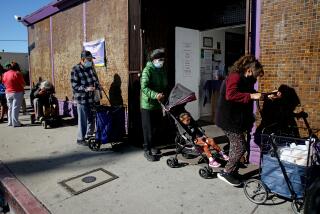Study Says Poor Lack Mobility to Obtain Aid : Transportation: A UCLA survey finds that welfare is available, but many cannot afford the cost of travel necessary to receive it. Those who work often commute on foot.
- Share via
To be poor in Los Angeles is to be not only without money, but also without mobility, according to a new UCLA study’s finding that a substantial number of the county’s homeless and working poor lack basic transportation.
The survey, prepared for the Western Center on Law and Poverty by a group of UCLA graduate students under the supervision of urban planning expert Martin Wachs, found that many of the county’s indigents cannot afford even a bus pass, and about a third of the working poor commute on foot.
Many rudimentary services such as showers, telephones, mailboxes and food are available to the very poor only at far-flung shelters, clinics, missions and bureaucratic agencies, the survey notes.
But 90% of those surveyed in the report said they had no car, and could not spare $42 for a bus pass because it would consume 10% or more of their monthly income.
“Transportation for the impoverished is filled with contradictions,” the report says. “(Mobility is) available, yet unaffordable to those with no money. Public welfare is available, yet requires mobility to fulfill the requirements. And social services are available yet inaccessible to those who lack mobility.”
As an example of this paradox, the study points to the difficulty respondents reported in complying with several rules governing general relief, the form of county aid most often allotted to the homeless.
Among other things, to prove they are trying to get off the dole, relief recipients must provide signed evidence that they have sought work at several job sites a month. They often have to travel long distances between shelters and social service agencies.
All this requires mobility, and state welfare regulations require counties to figure transportation needs into general relief benefits. But 47% of the general relief recipients interviewed for the study said they had never received so much as a bus token from the county.
*
Wachs blamed this situation on an interpretation of the law by the Los Angeles County government. Officials insist that travel allowances fall under a special category of relief that is disbursed at a caseworker’s discretion. Consequently, unless a caseworker volunteers bus tokens, relief recipients may miss out on the travel allowance because they do not know they should ask for it, the study concluded.
Karen Brown, supervisor of general relief for the county’s Department of Public Social Services, said officials could not comment because they had not had time to analyze the report.
More than a quarter of those surveyed said they were unable to seek work because they lacked transportation. Another 27% reported trouble getting to such crucial destinations as the welfare office, storage facilities and child care centers.
Sixty percent of the trips the respondents made were on foot, the survey found. Among those with jobs, 43% commuted by bus and another 32% walked to work.
“People were very frustrated in trying to get from one point to another,” said Peter Rowen, one of the students who conducted the study. “Some were optimistic, but a lot of them were in despair. They had just given up.”
The study was done at nine shelters throughout the county earlier this year, and was based on a survey of 203 people, 174 of them unemployed. About 43% received general relief. The average income for those studied was $442 a month.
More to Read
Sign up for Essential California
The most important California stories and recommendations in your inbox every morning.
You may occasionally receive promotional content from the Los Angeles Times.













